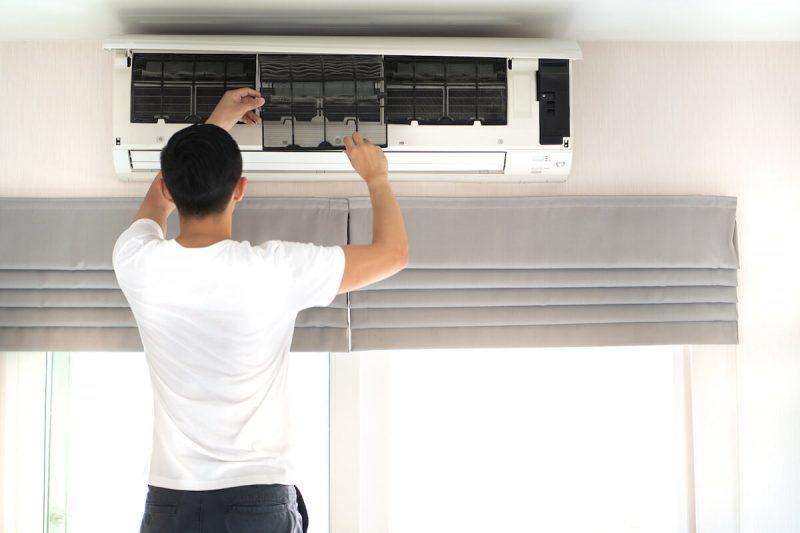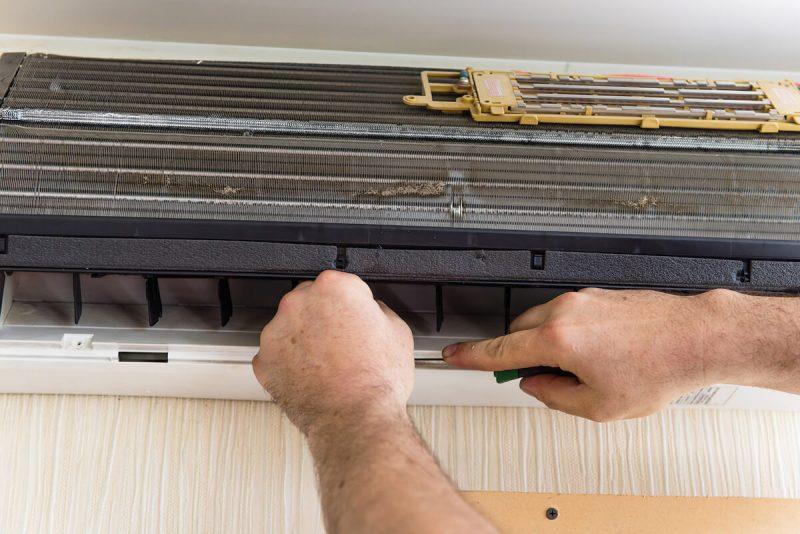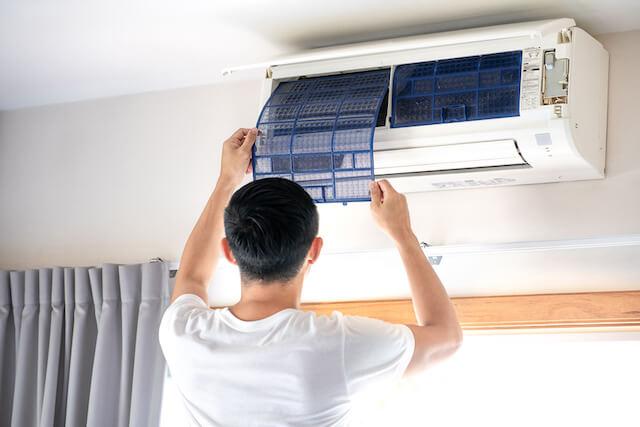Part 1: Introduction

One of the worst first-world problems you can have is to turn your air conditioner on, only to find that it is not doing the job it is supposed to do—cooling your room. An aircon that is not cold can be a source of frustration, especially during the sweltering heat. If your air conditioner starts blowing out warm air, it can be worrying. Ignoring this issue or delaying action can lead to even bigger problems down the road, requiring expensive repairs or even a complete replacement. The good news is that many common causes of an aircon not being cold are easy to identify and address with early intervention.
In this guide, we will take a look at the most common reasons why your aircon may not be cooling as it should, as well as provide you with practical solutions and aircon maintenance tips to restore its optimal performance. Whether it is something as simple as dirty air filters or as complex as an aircon refrigerant leak, addressing the problem quickly will not only save you money in the long term but will also help extend the lifespan of your aircon.
Part 2: Common Causes of Aircon Not Being Cold

2.1 Dirty Air Filters
How dirty filters affect cooling
Air filters play a crucial role in ensuring that the air circulating through your aircon is clean and the unit functions efficiently. Over time, however, these filters can become clogged with dust, dirt, and other debris, restricting airflow. When airflow is reduced, the aircon has to work harder to cool the room, resulting in inadequate cooling. If your aircon is not cold even after running for some time, it could be a sign that the filters are blocked and need attention.
Signs of dirty filters
If your aircon is running for extended periods without achieving the desired temperature or if you notice weak airflow, it is likely time to check the filters.
2.2 Refrigerant Leak
What refrigerant does for cooling
Air conditioning refrigerant is a vital component in the cooling process of the system. It absorbs heat from the air inside your home and releases it outside, thereby cooling the air. When there is a refrigerant leak, the refrigerant levels drop, preventing the aircon from performing its primary function effectively. A lack of refrigerant not only leads to your aircon not being cold, it also increases energy consumption as the system struggles to cool the space.
Signs of a refrigerant leak
If you notice a significant drop in cooling performance or if you see ice build-up on the evaporator coils, a refrigerant leak is likely the issue. Refrigerant leaks can also cause a hissing sound as the gas escapes. When this happens, it is important to contact a professional technician for a refrigerant refill, as handling refrigerant without proper knowledge can cause further damage to the system.
2.3 Faulty Thermostat
How thermostats regulate temperature
The thermostat is the brain of your aircon system. It regulates the temperature by signalling the aircon to turn on or off when the room reaches the desired temperature. A faulty thermostat can result in inaccurate temperature readings, leading to improper cooling and your aircon not being cold. If the thermostat is malfunctioning, your aircon may keep running even when the room is already cool, or it may shut off prematurely, causing the room to become warmer than expected.
Signs of a faulty thermostat
If your aircon continues to run even when the room feels cool or if it does not seem to cool the room to the right temperature, the thermostat may be the culprit. Make sure the thermostat is away from heat sources, such as direct sunlight or lamps, as these can cause the unit to misread the room temperature.
2.4 Dirty Condenser Coils
Effect on cooling
Condenser coils are essential in expelling heat from the refrigerant, allowing the aircon to cool the space effectively. However, when the condenser coils accumulate dirt, dust, and debris, they become inefficient. This dirt prevents the coils from releasing heat effectively, which leads to warm air circulating throughout the room. Dirty coils can significantly reduce the cooling efficiency of the unit, causing your aircon to not be cold.
How to prevent this
To maintain your aircon’s efficiency, regular condenser coil cleaning is necessary. Ideally, you should schedule professional aircon condenser cleaning services annually. Clean coils allow the system to work more efficiently, reducing wear and tear on the components.
Part 3: Troubleshooting Tips for Aircon Not Being Cold

3.1 Check and Clean the Air Filters
How to clean air filters
Air filters are essential for maintaining proper airflow in your aircon. If these filters are clogged, your unit will not be able to perform at its best. If you notice weak airflow or your aircon not being cold, it is likely that the filters are dirty. Cleaning the air filters is a straightforward process. Start by turning off the aircon and removing the filters from the unit. Gently vacuum or rinse them under lukewarm water to remove dirt. Allow them to dry thoroughly before reinserting them. If the filters are too dirty or damaged, consider replacing them with new ones.
Prevention
To prevent future issues, we recommend cleaning or replacing the filters every 1-3 months, depending on the frequency of aircon use. Regular aircon servicing and cleaning helps maintain optimal airflow, reduces energy consumption, and ensures the aircon cools efficiently. For top-notch professional air conditioner cleaning services, check out trusted and experienced providers with a strong track record like Airple.
3.2 Check Refrigerant Levels
How to check refrigerant levels
If the refrigerant levels are low, your aircon will not be cold, and you may notice a significant drop in cooling performance. While you will not be able to check the refrigerant levels yourself, a professional technician can measure them using a specialised gauge. If the levels are low, the technician can perform an AC refrigerant top-up or investigate for leaks.
Prevention
More often than not, a low refrigerant level points towards a possible gas leak, which can cause further damage to the system if left unaddressed. It is therefore important to get an aircon gas top up promptly. Additionally, regular aircon maintenance servicing can help prevent refrigerant-related issues by checking for leaks and topping up refrigerant as needed.
3.3 Inspect and Calibrate the Thermostat
How to check your thermostat
A malfunctioning thermostat can lead to inaccurate temperature readings, preventing your aircon from achieving the desired cooling. To ensure your aircon operates correctly, start by inspecting the thermostat’s settings. Check if it is set to the correct temperature and ensure it is not located near heat sources, such as direct sunlight or lamps, as this can skew its readings.
You can also test the thermostat by adjusting the temperature and observing if the aircon responds accordingly. If the unit doesn’t adjust as expected, recalibration may be necessary.
When to replace
If your aircon is still not cold after recalibration, or if your thermostat is old and consistently inaccurate, it may be time for a replacement. A faulty thermostat will cause the aircon to run inefficiently, consuming more energy without providing the desired cooling. Airple provides professional servicing to inspect and calibrate your thermostat, ensuring accurate temperature regulation and improved cooling performance for your home or office.
Part 4: What Happens If You Don’t Fix These Issues

4.1 Increased Energy Bills
Inefficiency causes higher costs
When your aircon is not cold or cooling effectively, it has to work harder and run for longer periods to reach the desired temperature. This inefficiency causes an increase in energy consumption, leading to higher electricity bills. As a result, not only will your space remain warm, but you will also see a noticeable spike in your energy costs.
Impact on your wallet
Addressing and fixing aircon problems such as blocked filters, refrigerant leaks, or malfunctioning components early can prevent this excess energy usage. Regular maintenance, such as aircon servicing and cleaning, ensures your system is working efficiently, helping you save money in the long run. However, if your air conditioner has run its course after about 10 to 15 years, take advantage of this and consider replacing it with a new energy-efficient air conditioner instead. Technically, you would be resolving your old aircon issues whilst enjoying energy savings with your new unit.
4.2 More Expensive Repairs
Small issues can escalate
An aircon that is not cold often signifies minor issues, but disregarding them could lead to bigger, more costly repairs down the line. For example, if a refrigerant leak or dirty coils is left unresolved, it can put additional strain on the system, damaging vital components such as the compressor. A malfunctioning compressor can be an expensive fix, often costing more than regular maintenance or minor repairs.
Long-term costs
By addressing problems early, you prevent further damage and reduce the risk of needing expensive replacements. Regular servicing and prompt repairs help maintain the efficiency of your air conditioning system, preventing minor issues from escalating. Whether it is an aircon refrigerant leak or the need for aircon servicing, addressing these concerns quickly can save you from major expenses in the future. Airple offers expert services to spot potential problems early, ensuring your aircon operates efficiently and avoiding costly repairs. Timely intervention is key to stopping your aircon from not being cold and prolonging the lifespan of your system.
4.3 Reduced Lifespan of the Aircon
Strain on the system
If you neglect minor aircon issues like low refrigerant levels, dirty filters, or blocked condenser coils, it can significantly impact your air conditioner's lifespan. These problems force the system to work harder, which puts additional strain on its components, from the motor fan to the aircon capacitor, leading to premature wear and tear. Beyond your aircon not being cold, this could cause the system to break down or fail entirely, which requires an expensive repair job or a replacement altogether.
Consequence
If you continue to skip maintenance or fail to fix minor issues, your aircon could break down sooner than anticipated. Regular servicing is necessary to ensure that your aircon lasts longer and continues to perform well. Here at Airple, we offer thorough aircon servicing to ensure your unit operates optimally, preventing unnecessary damage.
FAQs
1. How often should I clean my air filters?
You should clean your aircon filters every 1 to 3 months, depending on how frequently the air conditioner is used. For households with pets or high dust levels, it is advisable to clean the filters more often. Regular cleaning helps maintain optimal airflow, improves cooling efficiency, and prevents the buildup of dirt and debris that can affect air quality. If the filters are damaged or excessively dirty, consider replacing them. Proper maintenance ensures your unit runs efficiently and minimises issues like your aircon not being cold or higher energy consumption.
2. Can I fix refrigerant leaks myself?
No, you should not attempt to fix refrigerant leaks in your aircon yourself. Handling refrigerant requires special knowledge and expertise due to its chemical properties and potential hazards. A professional technician is equipped to detect, repair leaks, and recharge the system safely. Improper handling can damage the system further or lead to safety risks, such as exposure to harmful gases. Additionally, in some regions, the handling of refrigerants is regulated, and a certified technician is required to perform such repairs. To ensure your aircon is repaired properly and efficiently, it is best to contact a professional air conditioning service.
3. What is the lifespan of an air conditioner?
The lifespan of an air conditioner typically ranges from 10 to 15 years, depending on factors such as the quality of the unit, how well it is maintained, and how frequently it is used. Regular maintenance, such as cleaning filters, checking refrigerant levels, and servicing components, can help extend the lifespan of the aircon.
In conclusion, addressing the common causes of your aircon not being cold is crucial to restoring its efficiency and preventing costly repairs. Regular maintenance can prevent many of these issues from escalating, ensuring your aircon performs optimally for years to come. If you are experiencing problems like dirty filters, refrigerant leaks, or thermostat issues, contact Airple today for professional aircon servicing. Our wide range of services are designed to effectively tackle any issue your aircon might be facing, restoring them to optimal conditions.
For more information or to schedule an appointment, please contact us today.
Sign up for our newsletter
Get the best content on user insights, design, and product management delivered to your inbox every week.
Share This Article



